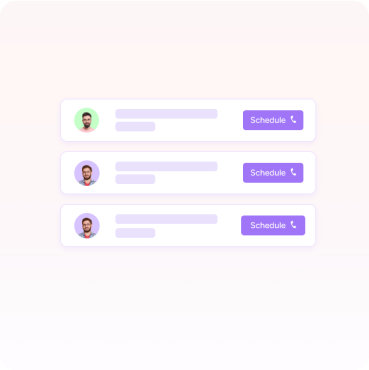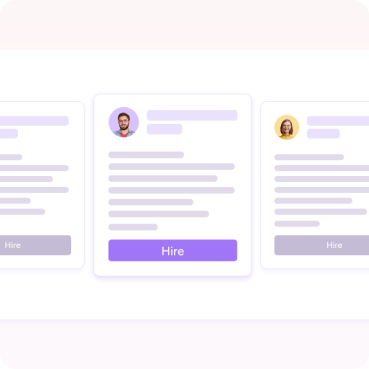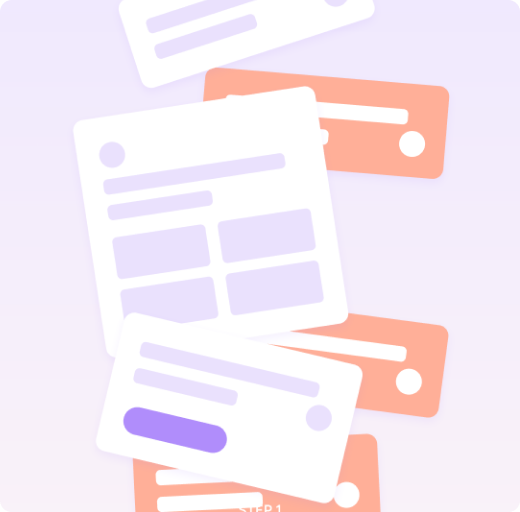Regular hiring
High RiskHire Android app developers of Silicon Valley caliber
Hire pre-vetted full time remote Android app developers from India. Hire now and build your dream engineering team with Hyno
Join 4,000+ companies already growing








Our Top Remote Developers
Hyno conducts rigorous testing and carefully vets the developers who are fueled by passion and skill sets. Hence, our developer community is the foundation for innovation and collaboration, bringing ideas and projects to fruition.
OUR STANDARDS
Hyno vs. Your regular recruitment process.
Find a risk-free, pre-interviewed, high-quality developer who is remote-ready in less than 2 weeks at 40% less cost.
Parameters
Choose the right for your firm.Time
Fees
Quality
Pre Screening
Remote readiness check
Termination
Failure rate
1 - 4 Months
> $1000
High
Low
Freelancing
High Risk1 - 2 Months
No fee
No
Very high
 Low Risk
Low Risk
0 - 15 Days
No fee
No
Very low
Pricing Starts from $35/hr
Accomplishing everything in just 3 steps
Our technical manager aligns the required skillset and tech stack with our talent pool to help you find the best fit.

Shortlisting candidates
Precise Hiring: Understanding, Gathering, and Shortlisting nittygritty.
-
 We start by thoroughly understanding your unique needs and specifications.
We start by thoroughly understanding your unique needs and specifications.
-
 check markWe
align the developer details with company goals. This way, we tailor the candidate
selection to seamlessly integrate with the organization’s vision and goals.
check markWe
align the developer details with company goals. This way, we tailor the candidate
selection to seamlessly integrate with the organization’s vision and goals.


Scheduling an Interview
Effortless talent selection: Finding your perfect match
-
 We connect you with the chosen candidates to ensure a personalized experience.
We connect you with the chosen candidates to ensure a personalized experience.
-
 Our rigorous
selection process guarantees that you find candidates who align seamlessly with your
requirements.
Our rigorous
selection process guarantees that you find candidates who align seamlessly with your
requirements.


Onboarding the talent
Streamlined onboarding for peak performance.
-
 The selected/qualified talent integrates smoothly through structured onboarding to
quickly adapt to projects, processes, and team dynamics.
The selected/qualified talent integrates smoothly through structured onboarding to
quickly adapt to projects, processes, and team dynamics.
-
 We go beyond
integration to offer ongoing support for a seamless transition to ensure that the
new talent exceeds your expectations.
We go beyond
integration to offer ongoing support for a seamless transition to ensure that the
new talent exceeds your expectations.


Read hiring guide
A one-stop shop to hiring the right Android Developer
How to hire a Android developer? Skills to look for, interview questions, and more
Hiring a dedicated developer for your business can be a cumbersome task. As many companies are competing to hire top Android developers, so finding a good developer is not as easy as it may seem.
We're here to assist all employers who choose to hire Android developers on their own. Recruiting a developer on your own requires a fair amount of software development experience in general. However, if you're a non-technical manager interested in learning more about how to hire a Android developer, we've put up an excellent resource for you.
Things to check Key Skills Required for a Android Developer?
The following are the key skills that a developer should possess to become proficient in Android:
1. Proficiency in Java/Kotlin programming language: Android app development primarily relies on Java and Kotlin programming languages. A skilled Android developer should be able to write clean, efficient, and well-structured code using these languages.
2. Knowledge of Android SDK and APIs: A skilled Android developer should have a good understanding of the Android Software Development Kit (SDK) and Application Programming Interfaces (APIs) to build native applications. This includes familiarity with different libraries and frameworks, such as Retrofit, Dagger, RxJava, etc.
3. Experience with Android Studio and development tools: Android Studio is the official Integrated Development Environment (IDE) for Android app development. A skilled Android developer should be proficient in using Android Studio and other development tools, such as Gradle, Git, and ADB.
4. Familiarity with user interface design and development: A skilled Android developer should have experience with designing and developing user interfaces (UIs) for Android apps, using XML and layout managers, such as LinearLayout and RelativeLayout.
5. Knowledge of database and data storage: An Android developer should have knowledge of different data storage mechanisms such as Shared Preferences, SQLite, and Room Persistence Library.
6. Understanding of version control systems: A skilled Android developer should be familiar with version control systems such as Git, and understand how to use them effectively in collaborative projects.
7. Understanding of testing and debugging: A skilled Android developer should understand how to test and debug Android apps effectively, using tools such as JUnit, Espresso, and Firebase Test Lab.
Ideal Hiring Process for Android Developer
1. Define the job requirements: Start by defining the job requirements and outlining the responsibilities and qualifications required for the position. This includes outlining the technical skills, experience level, and any other requirements that the candidate should meet.
2. Write a compelling job description: A well-crafted job description can help attract top talent. Be clear and concise in your job description, highlighting the key responsibilities, qualifications, and what you are looking for in a candidate.
3. Source candidates: Use online job boards, social media, and professional networking sites to source candidates. You can also work with recruiters or staffing agencies that specialize in remote hiring.
4. Screen candidates: Conduct initial screening interviews via video conferencing tools such as Zoom, Skype, or Google Meet to evaluate the candidate's skills and experience. You can also use coding challenges or technical assessments to test their skills.
5. Conduct follow-up interviews: Follow-up interviews should be more in-depth and should cover areas such as work experience, problem-solving skills, communication skills, and work ethics
6. Check references: Contact the candidate's references to confirm their work experience, communication skills, and work habits.
7. Offer the job: Once you have identified the best candidate, make a job offer that includes salary, benefits, and any other relevant details.
8. Onboard the developer: Provide a clear onboarding plan that outlines expectations, deliverables, and communication channels. You can also schedule regular check-ins and progress reviews to ensure that the developer is meeting expectations.
Important Interview questions to ask to Hire a Android Developer
What experience do you have with Java and Kotlin programming languages?
I have been developing Android applications for the past five years using both Java and Kotlin programming languages. I am proficient in writing clean, efficient, and well-structured code using both languages.
What Android SDKs and APIs have you worked with?
I have experience working with various Android SDKs and APIs, including the Android Support Library, Google Play Services, and Android Architecture Components. I am familiar with different libraries and frameworks, such as Retrofit, Dagger, and RxJava, and can implement them effectively in my projects.
Can you explain the difference between a service and a broadcast receiver in Android?
A service is a component that runs in the background to perform long-running tasks, while a broadcast receiver is a component that listens for system-wide events or broadcasts. Services can be used to play music, download files, or perform other background tasks, while broadcast receivers can be used to listen for system events such as network connectivity changes, battery level changes, etc.
How do you handle memory leaks in Android applications?
Memory leaks occur when objects are not properly released from memory, causing performance issues and crashes in Android applications. To prevent memory leaks, I use tools such as the Android Profiler to identify potential leaks and ensure that I release all resources when they are no longer needed. I also use the LeakCanary library to detect and fix memory leaks.
How do you handle device compatibility issues in Android applications?
I ensure that my Android applications are compatible with different devices by following Android's best practices for device compatibility. This includes designing responsive UIs that adapt to different screen sizes and densities, testing my applications on different devices and Android versions, and using compatibility libraries to support older Android versions.
How do you ensure the security of Android applications?
I follow Android's best practices for application security, including implementing encryption and secure communication protocols, using authentication and authorization mechanisms, and ensuring that my applications do not store sensitive data in plain text. I also conduct regular security audits to identify and fix vulnerabilities.
Can you explain the difference between SQLite and Room Persistence Library in Android?
SQLite is a lightweight database management system that is used to store data locally in Android applications, while Room Persistence Library is a wrapper around SQLite that provides an abstraction layer for easier database management. Room Persistence Library simplifies the development of database-backed applications by providing compile-time verification of SQL queries and eliminating boilerplate code.
What experience do you have with unit testing and UI testing in Android applications?
I have experience with both unit testing and UI testing in Android applications. I use JUnit for unit testing, which allows me to test individual components of my application in isolation. For UI testing, I use Espresso, which is a UI testing framework that allows me to write automated tests that simulate user interactions with my application.
What experience do you have with version control systems, and how do you use them in your development workflow?
I have experience with version control systems such as Git, which I use to manage changes to my codebase and collaborate with other developers. I use Git to track changes to my code, create branches for new features or bug fixes, and merge changes back into the main codebase.
Job Description Template for Android Developer
Location: [Insert Location]
Job Title: Android Developer
Position Type: Full-Time
Salary: [Insert Salary Range]
We are seeking a talented and experienced Android Developer to join our dynamic team. The successful candidate will be responsible for designing and developing innovative mobile applications for the Android platform. The ideal candidate will have a strong understanding of the Android SDK, a passion for mobile development, and the ability to work collaboratively with other developers, designers, and stakeholders.
Key Responsibilities:
- Design and develop advanced applications for the Android platform using the latest development tools and technologies
- Collaborate with cross-functional teams to define, design, and ship new features
- Write clean, maintainable, and efficient code using best practices and design patterns
- Continuously discover, evaluate, and implement new technologies to maximize development efficiency
- Participate in code reviews and contribute to the development of a high-quality codebase
- Ensure the performance, quality, and responsiveness of applications
- Work on bug fixing and improving application performance
- Maintain up-to-date knowledge of emerging trends and technologies in mobile development
Requirements:
- Bachelor's or Master's degree in Computer Science or a related field
- Proven working experience in Android app development
- Strong knowledge of the Android SDK and Android Studio
- Experience with Kotlin and/or Java programming languages
- Familiarity with RESTful APIs and integration with third-party libraries
- Experience with Git version control system
- Understanding of mobile application design principles and user interface guidelines
- Ability to work independently as well as in a team environment
- Excellent problem-solving and analytical skills
- Strong communication and interpersonal skills
Preferred Qualifications:
- Experience with Android Jetpack components, such as LiveData, ViewModel, and Room
- Knowledge of agile development methodologies such as Scrum or Kanban
- Familiarity with cloud-based services, such as Firebase and AWS
- Published one or more Android applications in the Google Play Store
- Familiarity with iOS app development is a plus
If you are an experienced Android Developer who enjoys working in a fast-paced, challenging environment, we would love to hear from you. Please submit your resume and cover letter for consideration.